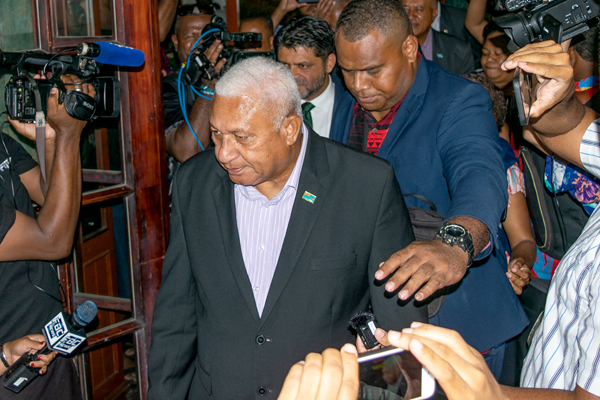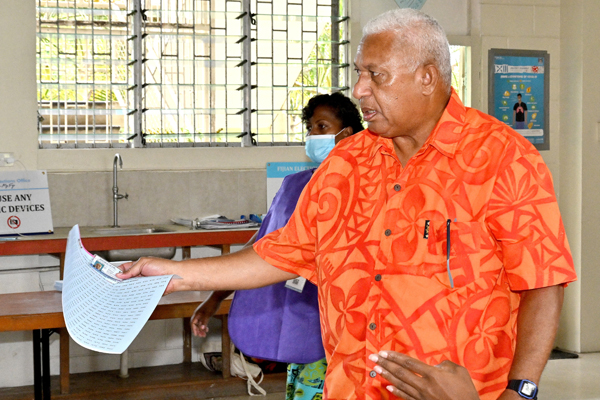Prime
Fiji govt accused of stoking fear to stay in power as troops deployed

Fiji's Prime Minister Frank Bainimarama (C) leaves after a second round of negotiations with the leadership of the Social Democratic Liberal Party (SODELPA), in Suva on December 23, 2022, a day after the government announced a post-election deployment to maintain "law and order". PHOTO / AFP
What you need to know:
- Former naval commander Bainimarama has led Fiji since a 2006 military putsch, and has refused to concede defeat following the elections on December 14.
- Former naval commander Bainimarama has led Fiji since a 2006 military putsch, and has refused to concede defeat following the elections on December 14.
Fiji's opposition on Friday accused the government of sowing "fear and chaos" in a bid to stay in power, as the military deployed to the streets of the capital Suva.
AFP reporters witnessed a small number of military vehicles on patrol, a day after Prime Minister Frank Bainimarama announced their mobilisation to maintain "law and order".
The scene was otherwise calm with people going about last-minute Christmas shopping.
Former naval commander Bainimarama has led Fiji since a 2006 military putsch, and has refused to concede defeat following the elections on December 14.
The vote resulted in the opposition -- led by rival ex-coup leader and former prime minister Sitiveni "Rambo" Rabuka -- cobbling together enough seats to form a coalition government.
Bainimarama's allies have delayed a parliament sitting to nominate Rabuka as the next prime minister.
Meanwhile, Bainimarama has cited unsubstantiated reports of post-vote ethnic violence as a reason to deploy the military and "fulfil our duty" to keep Fiji safe.
Under Fiji's constitution, the military has broad powers to intervene in politics and has been involved in four coups in the last 35 years.
Many Fijians fear the government's claims of ethnic violence and the military deployment are a pretext for a "creeping coup".
Australia has warned tens of thousands of its citizens visiting Fiji on summer holidays "to avoid any post-election demonstrations, rallies and public gatherings, which could occur with little warning".
On Friday, Rabuka slammed the government for alleging that levels of racism have heightened after the election.
He said top government officials were "sowing fear and chaos" and "trying to set the nation alight along racial lines".
'#FijiIsUnited'
Fiji, a nation of more than 300 South Pacific islands, has a large Indo-Fijian minority and intercommunal violence has been a problem in the past.
But, Rabuka claimed: "Senior police officials have confirmed to us that these stone-throwing claims targeting Indo-Fijians are fabrications."
Some Fijians have turned to social media to rubbish claims of divisions and unrest.
Using the hashtag #FijiIsUnited, they posted images of themselves with friends of other ethnic groups, messages of solidarity and mundane photos as evidence that life continues as normal.
The Fiji police force number two, assistant commissioner Abdul Khan -- an Indo-Fijian -- abruptly resigned from the force, reportedly in protest at the government's actions.
While parliament has been delayed, Bainimarama's allies have worked to unpick the opposition's coalition agreement.
But members of the small Social Democratic Liberal Party on Friday resisted intense pressure to reverse their support for Rabuka and join a Bainimarama government.
Party leader Viliame Gavoka said a second party vote on the coalition on Friday was "very close", but again sided with Rabuka.
"Democracy has won, we observed the process to its fullest, we went into it fully committed to ensuring we have the best for this country," he said.
He added that parliament would be convened "shortly" to vote on the new government.





